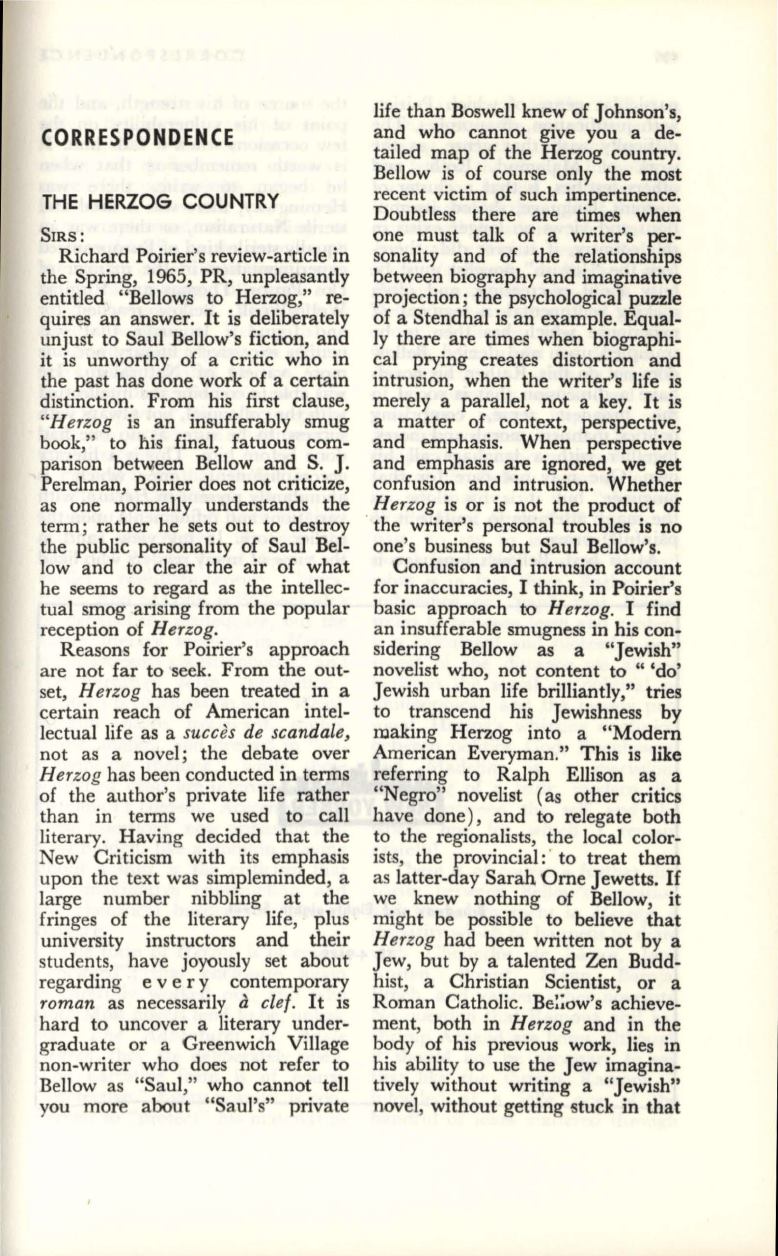
CORRESPONDENCE
THE HERZOG COUNTRY
SIRS:
Richard Poirier's review-article in
the Spring, 1965, PR, unpleasantly
entitled "Bellows to Herzog," re–
quires an answer. It is deliberately
unjust to Saul Bellow's fiction, and
it is unworthy of a critic who in
the past has done work of a certain
distinction. From his first clause,
"Herzog
is an insufferably smug
book," to his final, fatuous com–
parison between Bellow and S. J.
Perelman, Poirier does not criticize,
as one normally understands the
term; rather he sets out to destroy
the public personality of Saul Bel–
low and to clear the air of what
he seems to regard as the intellec–
tual smog arising from the popular
reception of
Herzog.
Reasons for Poirier's approach
are not far to seek. From the out–
set,
Herzog
has been treated in a
certain reach of American intel–
lectual life as a
succes de scandale,
not as a novel; the debate over
Herzog
has been conducted in terms
of the author's private life rather
than in terms we used to call
literary. Having decided that the
New Criticism with its emphasis
upon the text was simpleminded, a
large number nibbling at the
fringes of the literary life, plus
university instructors and their
students, have joyously set about
regarding eve r y contemporary
roman
as necessarily
a
clef.
It is
hard to uncover a literary under–
graduate or a Greenwich Village
non-writer who does not refer to
Bellow as "Saul," who cannot tell
you more about "Saul's" private
life than Boswell knew of Johnson's,
and who cannot give you a de–
tailed map of the Herzog country.
Bellow is of course only the most
recent victim of such impertinence.
Doubtless there are times when
one must talk of a writer's per–
sonality and of the relationships
between biography and imaginative
projection; the psychological puzzle
of a Stendhal is an example. Equal–
ly there are times when biographi–
cal prying creates distortion and
intrusion, when the writer's life is
merely a parallel, not a key. It is
a matter of context, perspective,
and emphasis. When perspective
and emphasis are ignored, we get
confusion and intrusion. Whether
.
Herzog
is or is not the product of
the writer's personal troubles is no
one's business but Saul Bellow's.
Confusion and intrusion account
for inaccuracies, I think, in Poirier's
basic approach
to
Herzog.
I find
an insufferable smugness in his con–
sidering Bellow as a "Jewish"
novelist who, not content to "'do'
Jewish urban life brilliantly," tries
to transcend his Jewishness by
making Herzog into a "Modern
American Everyman." This is like
referring to Ralph Ellison as a
"Negro" novelist (as other critics
have done), and to relegate both
to the regionalists, the local color–
ists, the provincial: ' to treat them
as latter-day Sarah Orne Jewetts.
If
we knew nothing of Bellow, it
might be possible to believe that
Herzog
had been written not by a
Jew, but by a talented Zen Budd–
hist, a Christian Scientist, or a
Roman Catholic.
Be~;ow's
achieve–
ment, both in
Herzog
and in the
body of his previous work, lies in
his ability to use the Jew imagina–
tively without writing a "Jewish"
novel, without getting stuck in that


